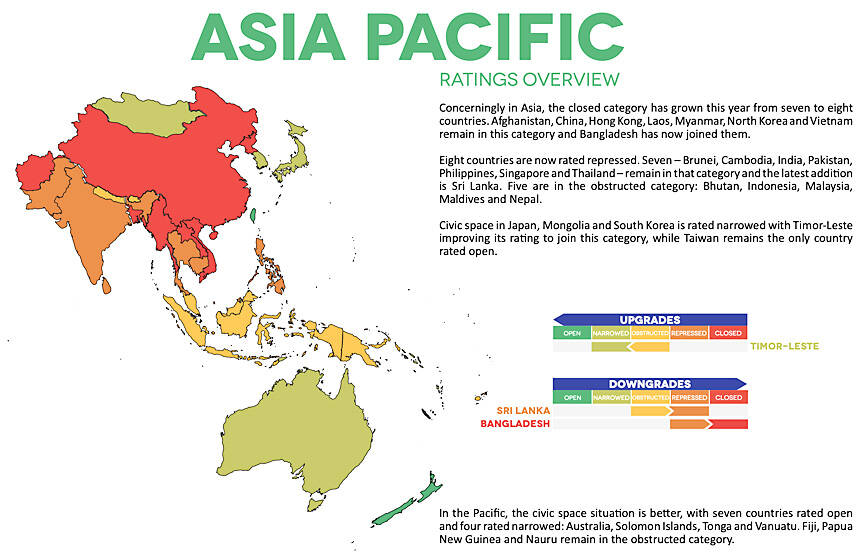Taiwan remains the only country in Asia with an “open” civic space for the fifth consecutive year, the Civicus Monitor said in a report released yesterday.
The People Power Under Attack 2023 report named Taiwan as one of only 37 open countries or territories out of 198 globally, and the only one in Asia.
Compiled by Civicus — a global alliance of civil society organizations dedicated to bolstering civil action — the ranking compiled annually since 2017 measures the state of freedom of association, peaceful assembly and expression around the world.

Photo courtesy of Civicus Monitor
Researchers assign each country or territory one of five rankings describing the state of its civic space as open, narrowed, obstructed, repressed or closed.
This year, 37 were considered open, 43 were narrowed, 40 were obstructed, 50 were repressed and 28 were closed.
By population, only 2.1 percent of people live in open societies — half the percentage reported six years ago — while 40.3 percent are in repressed societies and 30.6 percent are in closed societies.
Eight of the 26 countries or territories in Asia were rated as closed, up from seven last year, as Bangladesh joined China, Hong Kong, North Korea, Vietnam, Laos, Myanmar and Afghanistan in the bottom ranking.
Citing Reporters Without Borders data, Civicus said that Taiwan ranked 35th globally for press freedom and the government generally respects those freedoms.
Taiwan has a rich media environment, and the government respects and upholds its people’s liberties and rights of assembly, allowing the public to protest without undue limitations, the report said.
In contrast, Bangladesh launched a sweeping and violent crackdown on opposition parties ahead of general elections, arresting nearly 10,000 activists, and has been downgraded to the lowest rank.
Sri Lanka has also been downgraded to repressed after it continued to crack down on dissidents and activists.
Josef Benedict, a Civicus researcher covering the Asia-Pacific region, said that with the civic space in the region continuing to shrink, Taiwan maintaining an open civic space is positive, as it shows that human rights and civic space development in the region are not all bad, and that some nations are still serious about their international responsibilities.
Taiwan has become a haven for journalists and dissidents from other nations, allowing them to continue their work safely, he added.
Countries that want to develop their civic spaces should look to Taiwan to learn from it, he said.
However, Taiwan has room for improvement, Benedict said, adding that the defamation laws under Article 310 of the Criminal Code could be used to oppress freedom of speech.
While there is freedom to form unions in Taiwan, the nation also has strict rules against strikes, he said.

MAKING WAVES: China’s maritime militia could become a nontraditional threat in war, clogging up shipping lanes to prevent US or Japanese intervention, a report said About 1,900 Chinese ships flying flags of convenience and fishing vessels that participated in China’s military exercises around Taiwan last month and in January have been listed for monitoring, Coast Guard Administration (CGA) Deputy Director-General Hsieh Ching-chin (謝慶欽) said yesterday. Following amendments to the Commercial Port Act (商港法) and the Law of Ships (船舶法) last month, the CGA can designate possible berthing areas or deny ports of call for vessels suspected of loitering around areas where undersea cables can be accessed, Oceans Affairs Council Minister Kuan Bi-ling (管碧玲) said. The list of suspected ships, originally 300, had risen to about 1,900 as

Japan’s strategic alliance with the US would collapse if Tokyo were to turn away from a conflict in Taiwan, Japanese Prime Minister Sanae Takaichi said yesterday, but distanced herself from previous comments that suggested a possible military response in such an event. Takaichi expressed her latest views on a nationally broadcast TV program late on Monday, where an opposition party leader criticized her for igniting tensions with China with the earlier remarks. Ties between Japan and China have sunk to the worst level in years after Takaichi said in November that a hypothetical Chinese attack on Taiwan could bring about a Japanese

Right-wing political scientist Laura Fernandez on Sunday won Costa Rica’s presidential election by a landslide, after promising to crack down on rising violence linked to the cocaine trade. Fernandez’s nearest rival, economist Alvaro Ramos, conceded defeat as results showed the ruling party far exceeding the threshold of 40 percent needed to avoid a runoff. With 94 percent of polling stations counted, the political heir of outgoing Costa Rican President Rodrigo Chaves had captured 48.3 percent of the vote compared with Ramos’ 33.4 percent, the Supreme Electoral Tribunal said. As soon as the first results were announced, members of Fernandez’s Sovereign People’s Party

MORE RESPONSIBILITY: Draftees would be expected to fight alongside professional soldiers, likely requiring the transformation of some training brigades into combat units The armed forces are to start incorporating new conscripts into combined arms brigades this year to enhance combat readiness, the Executive Yuan’s latest policy report said. The new policy would affect Taiwanese men entering the military for their compulsory service, which was extended to one year under reforms by then-president Tsai Ing-wen (蔡英文) in 2022. The conscripts would be trained to operate machine guns, uncrewed aerial vehicles, anti-tank guided missile launchers and Stinger air defense systems, the report said, adding that the basic training would be lengthened to eight weeks. After basic training, conscripts would be sorted into infantry battalions that would take